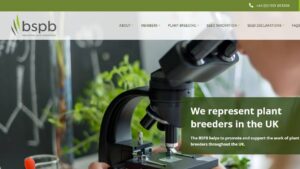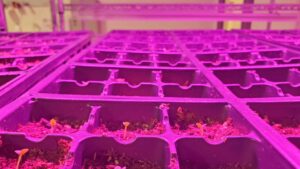When it comes to the UK leaving the EU, the real issue is the complete uncertainty: Are we leaving? When are we leaving? On what terms are we leaving?
European Seed’s sister publication, Seed World, sat down with Penny Maplestone, chief executive of the British Society of Plant Breeders, to discuss that dreaded B-word, and how plant breeders can prepare for Britain’s seemingly inevitable exit from the European Union. Interview conducted at the International Seed Federation’s 2019 World Seed Congress in Nice, France.
European Seed (ES): How did you get into plant breeding and what gets you up in the morning?
Penny Maplestone (PM): I have always been in love with plants, right back from when I was a small child out on walks in the countryside with my parents, wanting to find out the names of all the wonderful wildflowers we saw. That love has stayed with me through my whole life. There was never any question I would study anything but botany once I had found out how critical plants are for everything in life; how they feed us, give us feed for our animals, clothe and shelter us, and even produce the oxygen in the air that we breathe.
I learned about plant breeding and plant breeders, how plant breeders take plants which are already incredible – and make them even better, how they improve yield, pest and disease resistance, and quality, making crops better adapted to our human needs. I did my first degree – and this is going to date me a bit – just at the time that plant molecular biology was born, and the first transgenic plants were made. That was a real ‘wow’ moment for me, and the possibilities seemed endless.
I spent a little time doing research but turned out not to be very good at it. I didn’t think it would benefit either me or science if I stayed with it, so I needed to look for something that was going to keep me close to plants but use my other skills. A job at BSPB was advertised. I thought ‘I could do that’ and I must have been right as I have now been there more than 20 years.
It really is the perfect job. It’s a wonderful mixture of plants and politics and people. Every day is different. I get out of bed in the morning happy in the knowledge that I am off to work with my fantastic team at BSPB and that we are supporting an industry which is genuinely making a positive difference in the world.
ES: What does the BSPB look like today? Can you give us a snapshot of that?
PM: The BSPB looks good today. We are in our 53rdyear, we have 72 members, which is more than we have ever had before, and that’s at a time when the industry is consolidating, so I am quite proud of that. Our services to members are excellent. An ISF study showed that our combined royalty and farm-saved seed collection system is one of the best in the world and has helped to put the UK close to the top of the list globally as one of the best countries to do plant breeding business.
Of course, we don’t want to stand still. All the time we are thinking strategically and looking to the future. The industry is evolving, and we want to make sure that we are offering our members top quality services that will support them for years to come.
ES: I want to talk about a big issue that is on everyone’s mind. Do a little psychological exercise with you. Psychologists sometimes do that inkblot test where you look at the inkblot and tell them what it looks like to you. I want to do something similar but with a word: Brexit. As a British plant breeder, how does it make you feel to hear that word and why?
PM: My Brexit inkblot is a black nebulous cloud rolling in from the horizon towards me. Every so often it recedes a little, but inexorably it is coming and at some point, it is going to hit me as a reality. On a personal level, I feel sad about Brexit, I feel sad that the UK has chosen to leave the European Union. I voted to remain and when I’m working in ISF and ESA with my colleagues from other EU countries, it makes me genuinely sad that, although we will still work together, it will never be quite the same.

ES: Are your members prepared for Brexit and what’s your biggest concern and your biggest worry about that?
PM: Our members, are I hope are as prepared as they can be. We have certainly worked flat out in BSPB on this from the day of the referendum result. We were on the phone to the Ministry of Agriculture very quickly to say ‘you do know about plant breeding and how crucial it is to UK food and farming? You do know what an integrated European industry this is? You do know about the industry’s reliance on European plant variety rights and the EU Common Catalogue for protection and access to markets?’ We have been strong in representing our members’ views to government, in bringing information back and getting it out to our members as fast as we possibly can so that they can digest it and decide what actions they need to take.
BSPB members were all very well prepared for the 29thof March and had taken steps to prevent any disruption in supply to customers. But then, of course, we didn’t leave. So right now, it is quite difficult to be able to advise members on what to do. The real issue now is the complete uncertainty: Are we leaving? When are we leaving? On what terms are we leaving? If we don’t know what the end point looks like, it is very difficult to plan, it’s very difficult to advise any member on what they should do.
ES: Is there still a chance of staying in the EU? If not, what do British plant breeders have to do to prepare and what should British seed companies do to prepare as well?
PM: There is a very slim chance of ‘remain’. It is one of the possible ways out of the mess, but very dangerous politically for the country. It would leave a government and a nation having to deal with 52% of the population – the people who voted to leave – feeling disillusioned, disenfranchised, and angry. And they would want to vote out the government that kept them in the EU at the earliest opportunity. So, I think there are many dangers and it could potentially lead to the complete demise of the two-party political system in the UK. It is a possibility, but for these reasons, a remote one.
To prepare now, plant breeders in the UK market place should firstly consider joining BSPB if they are not already members because we have access to government, to government officials and to ministers, so we can represent their views and we can also bring them the latest news on Brexit and what’s happening as it happens. Individual companies don’t necessarily have that level of access because the government doesn’t have the resource to consult with everybody. So, if you are not yet a member of the association, we would very much welcome you to join.
Once you do have that information, as a company you need to look at your business model, consider the different scenarios, and work out what you need to do to be sure that you will continue to have intellectual property protection, and market access on both sides on the channel.
ES: What are you working on right now that excites you the most in the world of plant breeding?
PM: I think this has to be the whole story of gene editing. I am enormously excited by the power of the science and the speed at which it is developing. I have often heard the expression that plant breeding started with crossing the best and hoping for the best – and here we are now, able to make very precise edits in individual genes. That’s incredible evolution in the science of plant breeding.
When I look in the fields now, I can see sugar beet crops growing in their first year without neonicotinoid seed treatments and cereals about to go the same way but with very little if anything yet available by way of the resistant varieties that farmers now desperately need because they don’t have access to chemistry to help them avoid the problems of virus infection.
In Europe we have tied one hand behind the farmer’s back by taking away his chemical options and then in one deft move by the European Court we have tied the other hand too, by imposing a regulatory barrier to the plant breeding industry’s potential to deliver genetic alternatives as quickly as the science might allow. It seems bizarre that we depend completely on farmers for food production but have taken a series of regulatory decisions that make it much harder for them to do this.
It excites me that we have something in gene editing that can be a step change in developing better adapted crops faster than ever before. And it excites me to be able to work at a national level, and also with colleagues at ISF and ESA to try to secure regulatory reform, to give our plant breeders the opportunity to use this science and give farmers, and consumers the new products which they so desperately need.













